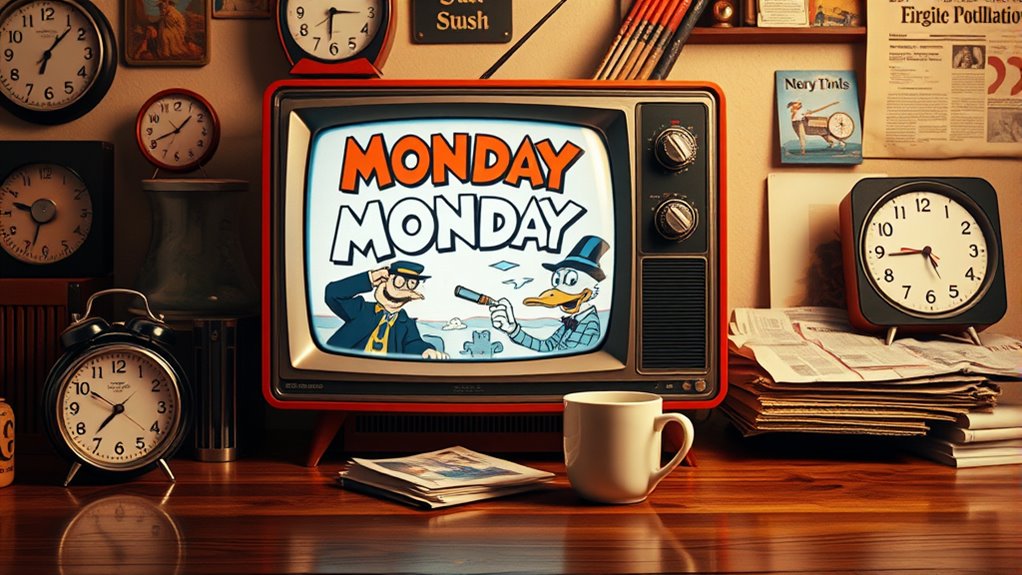The Monday myth stems from historical shifts during the industrial revolution, which established the five-day workweek and made Monday feel like the start of routines you dread. Media and advertising reinforce this idea by highlighting Monday struggles, creating a cycle of negativity. Cultural attitudes toward work and leisure shape how you perceive the day, often turning it into a symbol of stress and fatigue. To discover how society is shifting away from this stereotype and embracing new approaches, keep exploring further.
Key Takeaways
- The Monday myth originated from societal shifts during the industrial revolution, establishing Monday as the traditional start of the workweek.
- Media and advertising have reinforced negative stereotypes of Mondays as stressful, dull, and difficult, shaping popular perceptions.
- Pop culture memes and humor use Monday as a symbol of dread, perpetuating the day’s negative image and influencing societal attitudes.
- Cultural perceptions of Monday vary globally, with some societies emphasizing productivity, others leisure, affecting its portrayal in pop culture.
- Recognizing these origins and impacts can help challenge stereotypes, fostering healthier attitudes and more positive representations of Mondays.
The Historical Roots of the Monday Myth
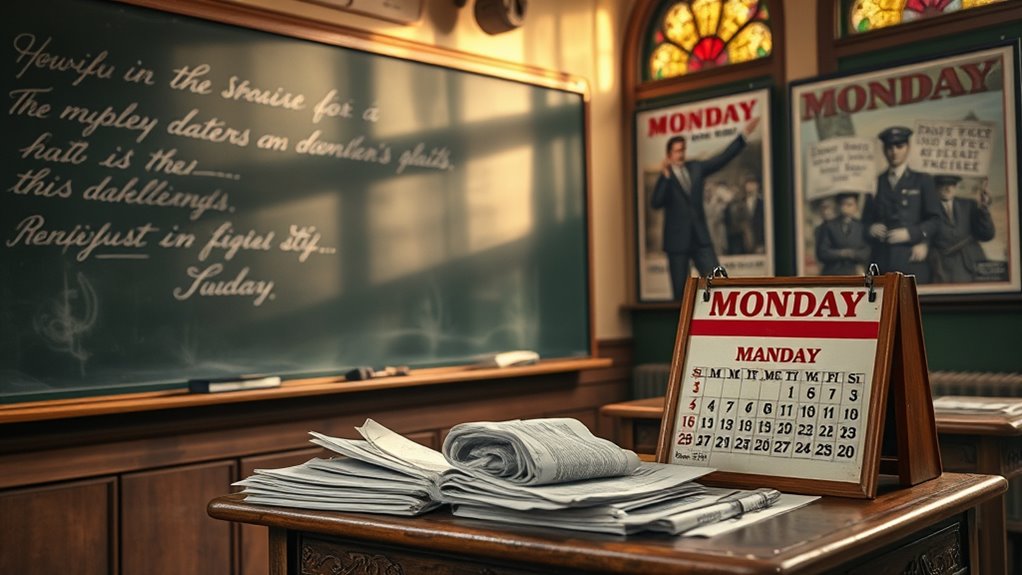
The Monday Myth has deep historical roots that date back centuries, shaping how societies perceive the start of the workweek. During the industrial revolution, labor movements began advocating for better working conditions and shorter hours. As factories expanded, workers fought to reduce long, grueling shifts, pushing for reforms that eventually led to the standard five-day workweek. This shift made Monday the traditional start of the work routine, reinforcing societal expectations. The labor movement played a critical role in solidifying Monday’s status as the beginning of the working week, establishing routines that persisted through history. These changes weren’t just about productivity—they also influenced cultural perceptions, embedding the idea that Mondays mark the official return to work after the weekend. Additionally, the development of the five-day workweek was influenced by various social and economic factors, including candy consumption patterns, which became associated with the start of the workweek in some cultures.
How Media Shaped Monday Narratives
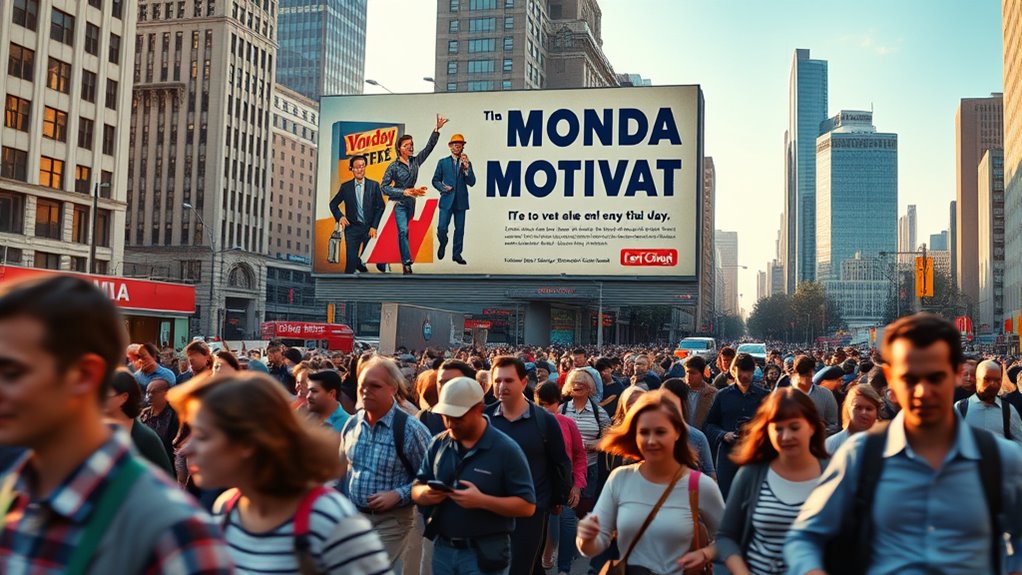
Media outlets have played a pivotal role in shaping how society views Mondays, often framing the start of the week as a dreaded return to routine. They highlight common morning routines, like reaching for coffee as a boost to face the day, reinforcing the idea that Mondays are tough. Stories and headlines emphasize the struggle to get out of bed, linking coffee culture to the broader narrative of Monday misery. By consistently portraying Mondays as stressful and uninviting, media reinforce negative stereotypes, making it seem like everyone shares this sentiment. This portrayal influences public perception, creating a self-fulfilling cycle where people feel less enthusiastic about Mondays, simply because they’ve been conditioned to see them that way through media narratives. Additionally, the Monday myth persists partly because of how media perpetuate these negative images, which can impact workplace morale and individual mindset at the start of each week.
The Role of Advertising in Reinforcing Monday Stereotypes
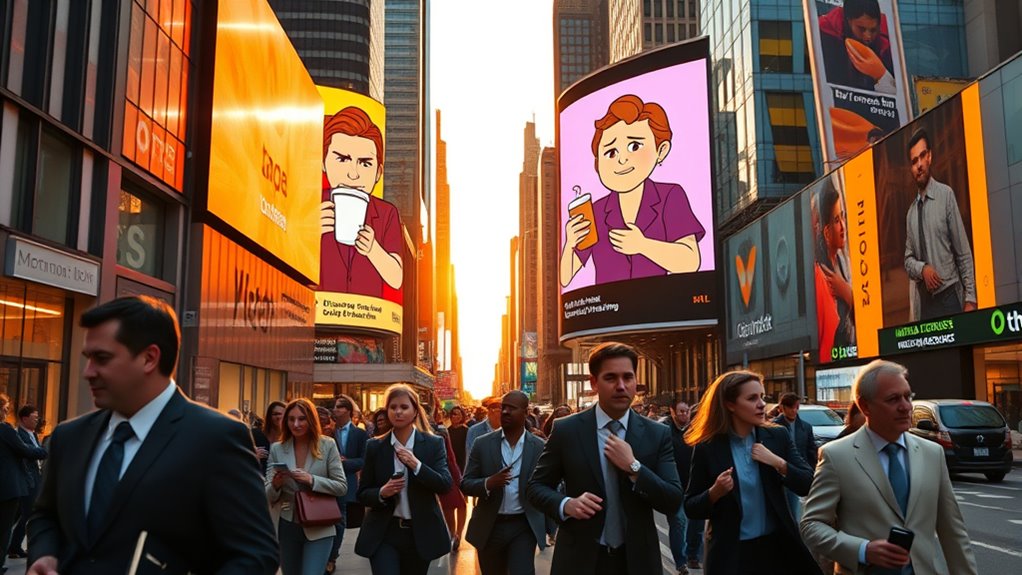
Advertising often emphasizes the change from weekend relaxation to Monday’s hustle, reinforcing the idea that Mondays are unpleasant. You’ll notice how campaigns target the shift, portraying Monday as a hurdle to overcome. These messages help cement stereotypes that Mondays are a difficult start, shaping how you perceive the beginning of the week. Additionally, such portrayals can influence attitudes towards mental well-being, framing Monday as a stressful day rather than an opportunity for fresh beginnings.
Weekend to Work Transition
As the weekend winds down, advertising campaigns often flood your screens with messages that prepare you to shift from relaxation to productivity. These ads subtly reinforce the idea that your weekend relaxation is ending and that Monday is a fresh start for work. They tap into holiday traditions and routines, emphasizing the need to prepare mentally and physically for the upcoming week. By highlighting productivity tools, early alarm clocks, and coffee, these messages make the transition feel inevitable and necessary. This constant reminder shapes your perception of Mondays as the ultimate workday, overshadowing the enjoyment of weekend leisure. Over time, it deepens the myth that Mondays are inherently unpleasant, making the transition from weekend to work seem like an unavoidable rite of passage. Additionally, the portrayal of high-tech home entertainment devices in marketing can reinforce the idea that leisure activities are best enjoyed before the workweek begins, further emphasizing the Monday myth.
Advertising’s Monday Messages
Since marketers consistently target you with messages that depict Mondays as tedious and burdensome, advertising plays a crucial role in shaping your perception of the start of the week. Ads often highlight the contrast between restful sunday relaxation and the rush to regain monday productivity. You see products and services positioned as essential for overcoming Monday blues or boosting energy levels, reinforcing the idea that Mondays are inherently stressful. This messaging feeds into the stereotype that you must push through a difficult day after a relaxing weekend. By emphasizing the need for coffee, productivity tools, or energy drinks, advertising deepens the association between Monday and exhaustion. As a result, these messages make it seem natural to view Monday as the most challenging day of the week.
Stereotyping in Campaigns
Campaigns often reinforce the idea that Mondays are inherently difficult by repeatedly portraying them as the most stressful day of the week. Through corporate branding, advertisers emphasize the struggle of returning to work, often highlighting fatigue and frustration. This stereotyping extends to fashion trends, where clothing choices for Monday emphasize dull, muted colors to symbolize the “Monday mood.” Such portrayals shape public perception, making it seem natural that Mondays are challenging. By consistently linking Monday with stress and negativity, campaigns solidify these stereotypes, influencing how you view the start of the week. This reinforcement not only impacts individual mindset but also perpetuates a broader cultural narrative that Mondays are inherently tough, making it harder to approach the week with positivity. Additionally, these advertising strategies often leverage stereotyping in campaigns to maintain and amplify these perceptions across different media platforms.
Cultural Attitudes Toward Work and Leisure
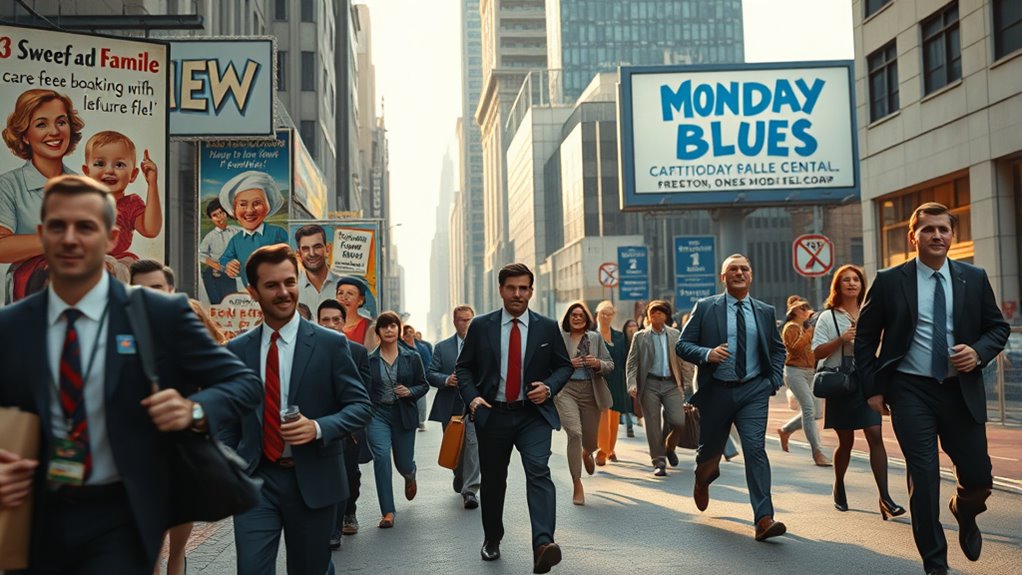
Cultural attitudes toward work and leisure shape how societies perceive the significance of Monday and the start of the workweek. In some cultures, Monday is seen as a fresh start, emphasizing productivity and work ethic. Others prioritize work life balance, viewing leisure activities as essential for well-being. This mindset influences how you approach Mondays: some see them as an opportunity, while others dread the return to routine. Here’s a glimpse of different perspectives:
| Culture Type | Attitude Toward Monday |
|---|---|
| Work-Centric Societies | Monday equals productivity, little leisure |
| Leisure-Focused Societies | Emphasize leisure activities, flexible start |
| Balanced Cultures | Value work life balance, moderate approach |
| Traditional Societies | Respectful of work routines, formal start |
| Progressive Cultures | Promote innovation, flexible work schedules |
Your attitude toward Monday reflects these broader cultural values. Recognizing how cultural perceptions of work influence individual attitudes can help foster a healthier relationship with the start of the week.
The Evolution of Monday in Popular Humor and Memes
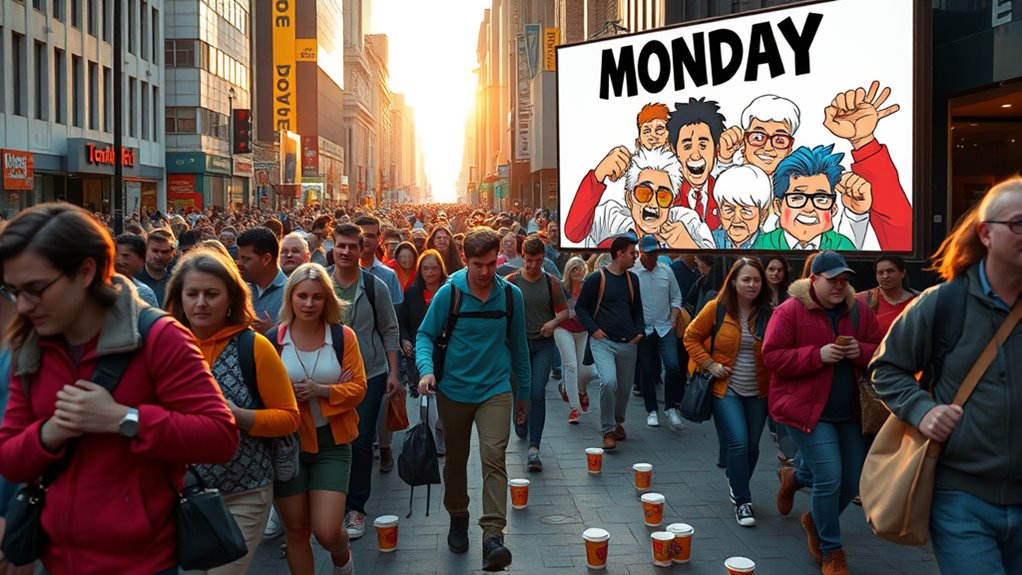
Have you ever noticed how Monday humor has evolved from simple jokes to a widespread internet phenomenon? It’s become a form of comic relief, helping people cope with the start of the week. Early memes focused on relatable frustrations, like snooze buttons and coffee addiction. Over time, the meme evolution transformed these jokes into creative, often humorous images and videos shared across social media platforms. This shift/gradation made Monday humor more engaging and accessible, turning a common dislike into a shared cultural experience. Memes now serve as a quick, lighthearted way to connect, making the Monday myth more palatable. As society increasingly uses humor to cope with daily stressors, dynamic communication exercises for couples have also gained popularity as a way to foster understanding and support. By evolving from basic jokes to complex memes, society has reinforced the idea that Monday is something to laugh at, easing the transition back to work.
Psychological Effects of the Monday Myth

The Monday myth considerably influences how people feel about the start of the week, often shaping their mood and outlook. This belief can heighten work-related anxiety, making Monday seem formidable before you even begin. It also leads to mood fluctuations, where you might feel energized one moment and overwhelmed the next. Here are some psychological effects to consider:
- Increased stress: The myth amplifies stress, making you dread returning to work.
- Negative bias: You may subconsciously associate Mondays with failure or disappointment.
- Reduced motivation: The stigma can sap your enthusiasm for tackling tasks.
- Anticipatory anxiety: You start worrying about the week ahead, increasing anxiety levels.
- Cognitive bias reinforcement: Beliefs rooted in the Monday myth can reinforce negative thought patterns, making these effects more persistent.
Recognizing these effects helps in managing your mindset and reducing negative impacts.
Challenging the Monday Stereotype in Modern Culture

Many people are now redefining what Mondays can be, moving beyond traditional workweek norms. You can find ways to start your week with purpose and enthusiasm, challenging the stereotype that Mondays are only about stress. Embracing Monday motivation helps shift perceptions and sets a positive tone for the days ahead. Recognizing the clutter-free space as part of a balanced lifestyle can further enhance your motivation to approach Mondays with a fresh perspective.
Breaking the Workweek Norms
Challenging the Monday stereotype has become a growing trend as more workplaces and individuals rethink traditional workweek structures. You’re now more aware of how Sunday blues and work anxiety influence your mindset. To break the norm:
- Many companies offer flexible schedules, letting you start your week whenever you’re most productive.
- Remote work options reduce the dread of Monday mornings and ease Sunday blues.
- Some workplaces implement four-day workweeks, giving you longer weekends to recharge.
- You can prioritize mental health by shifting deadlines or adjusting workloads, challenging the idea that Mondays are the only way to start fresh.
- Incorporating sound design techniques into workplace wellness programs can help create calming auditory environments that reduce stress and improve focus.
This shift helps you avoid the trap of work anxiety, making your week more manageable and less tied to outdated stereotypes about Mondays.
Embracing Monday Motivation
Reframing how you approach Mondays can transform them from dreaded start to a source of motivation. By adopting effective motivational strategies, you can set a positive tone for the week. Prioritize weekend recovery to ensure you’re refreshed, making Monday feel less overwhelming. Shift your mindset from viewing Monday as a hurdle to seeing it as an opportunity for growth. Incorporate small wins and goal-setting to boost your confidence early in the week. Here’s a simple guide:
| Strategy | Focus Area | Benefit |
|---|---|---|
| Plan ahead | Weekend recovery | Reduced stress |
| Set realistic goals | Monday motivation | Increased productivity |
| Practice gratitude | Mindset shift | Improved outlook |
| Celebrate small wins | Weekly momentum | Boosted motivation |
| Reflect on progress | Personal growth | Long-term success |
The Future of Mondays in a Changing Work Environment
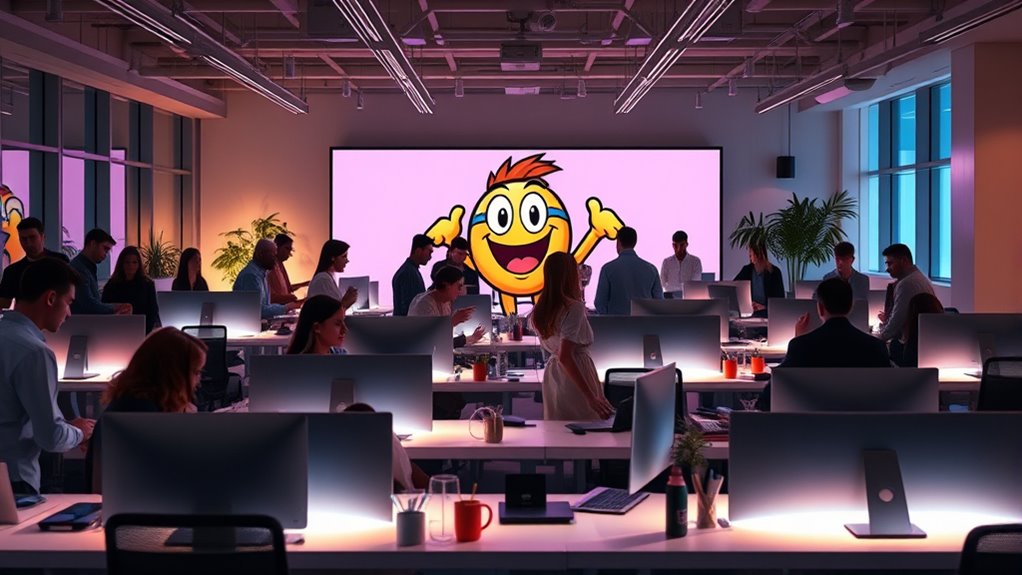
As remote work and flexible schedules become more prevalent, Mondays are evolving from the traditional start-of-week dread into an opportunity for renewed productivity and engagement. With these changes, you can reframe Mondays as a fresh start rather than a burden. Here are ways this shift is shaping the future:
Remote work transforms Mondays into opportunities for productivity and a fresh start.
- Increased autonomy allows you to plan your week effectively.
- Flexible schedules enable you to work during your most productive hours.
- Remote work reduces commute stress, making Mondays more manageable.
- Teams can collaborate seamlessly across different time zones, fostering innovation.
Frequently Asked Questions
How Did the Monday Myth Originate Before Modern Media Influence?
You might not realize it, but the Monday myth started long before modern media, rooted in labor union origins and religious sabbath practices. Workers sought to standardize their days off, often aligning with religious rest days, which made Mondays seem like a natural start to the week. Over time, this belief solidified, shaping our perception of Mondays as the beginning of the workweek, even before today’s media reinforced it.
Are There Cultures That Do Not Associate Negative Feelings With Mondays?
You might be surprised to learn that some cultures see Monday positivity instead of negativity. For example, certain societies celebrate Monday as a fresh start or a day for cultural celebrations, fostering positive feelings. You’ll find that in these cultures, Mondays don’t carry the usual burden of dread, showing that attitudes toward the week’s start can vary widely based on local customs and perspectives.
What Are Lesser-Known Historical Events Linked to Monday Stereotypes?
Did you know that some historical superstitions linked Mondays to bad luck, dating back centuries? Early labor movements also played a role, as workers often viewed Mondays as a symbol of harsh workweeks. These lesser-known events shaped Monday stereotypes, reinforcing negative feelings. You might not realize that these historical superstitions and labor struggles contributed to the modern perception of Mondays as difficult, influencing pop culture and workplace attitudes today.
How Do Personal Experiences Shape Individual Perceptions of Mondays?
Your personal bias and routine stress heavily influence how you perceive Mondays. If you’ve had negative experiences or feel overwhelmed at the start of the week, you’re more likely to see Monday as a dreaded day. Conversely, positive routines or anticipation of something enjoyable can make Mondays feel invigorating. Your mindset shapes your perception, so changing your attitude or routine can help you view Mondays more favorably and reduce stress.
Can Changing Work Practices Alter the Cultural Significance of Mondays?
Coincidentally, as you embrace remote work and flexible schedules, you might notice Mondays losing some of their traditional negativity. Changing work practices can reshape the cultural significance of Mondays, making them less dreaded and more neutral or even positive. When people have more control over their routines, the Monday myth weakens, fostering a healthier attitude towards the start of the week and altering longstanding perceptions.
Conclusion
So, after all this, maybe Monday’s not the villain we’ve made it out to be. Instead of dreading it, you might realize it’s just a myth fueled by stories, ads, and memes. Ironically, the more we fight Monday’s reputation, the more it sticks around. Perhaps the real lesson is to change your attitude—because in the end, Monday’s only as bad as you make it. Who knew a day could be so misunderstood?
